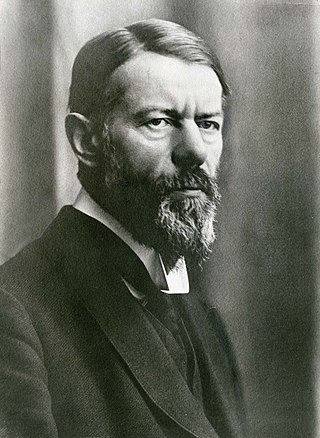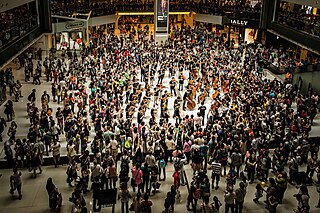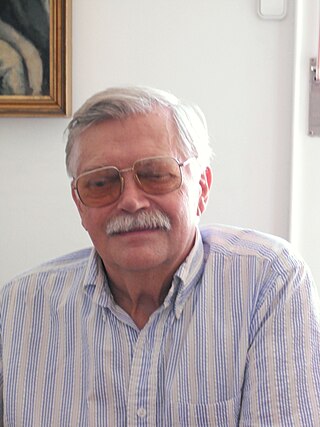
Maximilian Karl Emil Weber was a German sociologist, historian, jurist, and political economist who was one of the central figures in the development of sociology and the social sciences more generally. His ideas continue to influence social theory and research.

Sociology of religion is the study of the beliefs, practices and organizational forms of religion using the tools and methods of the discipline of sociology. This objective investigation may include the use both of quantitative methods and of qualitative approaches.

Urban sociology is the sociological study of cities and urban life. One of the field’s oldest sub-disciplines, urban sociology studies and examines the social, historical, political, cultural, economic, and environmental forces that have shaped urban environments. Like most areas of sociology, urban sociologists use statistical analysis, observation, archival research, census data, social theory, interviews, and other methods to study a range of topics, including poverty, racial residential segregation, economic development, migration and demographic trends, gentrification, homelessness, blight and crime, urban decline, and neighborhood changes and revitalization. Urban sociological analysis provides critical insights that shape and guide urban planning and policy-making.

Political sociology is an interdisciplinary field of study concerned with exploring how governance and society interact and influence one another at the micro to macro levels of analysis. Interested in the social causes and consequences of how power is distributed and changes throughout and amongst societies, political sociology's focus ranges across individual families to the state as sites of social and political conflict and power contestation.

The Protestant Ethic and the Spirit of Capitalism is a book written by Max Weber, a German sociologist, economist, and politician. Begun as a series of essays, the original German text was composed in 1904 and 1905, and was translated into English for the first time by American sociologist Talcott Parsons in 1930. It is considered a founding text in economic sociology and a milestone contribution to sociological thought in general.

Economic sociology is the study of the social cause and effect of various economic phenomena. The field can be broadly divided into a classical period and a contemporary one, known as "new economic sociology".

Comparative politics is a field in political science characterized either by the use of the comparative method or other empirical methods to explore politics both within and between countries. Substantively, this can include questions relating to political institutions, political behavior, conflict, and the causes and consequences of economic development. When applied to specific fields of study, comparative politics may be referred to by other names, such as comparative government.

Sociology as a scholarly discipline emerged, primarily out of Enlightenment thought, as a positivist science of society shortly after the French Revolution. Its genesis owed to various key movements in the philosophy of science and the philosophy of knowledge, arising in reaction to such issues as modernity, capitalism, urbanization, rationalization, secularization, colonization and imperialism.
Marxism is a political philosophy and method of socioeconomic analysis. It uses a materialist interpretation of historical development, better known as "historical materialism," to understand class relations and social conflict. It also uses a dialectical perspective to view social transformation. Marxism originates from the works of 19th-century German philosophers Karl Marx and Friedrich Engels. Marxism has developed over time into various branches and schools of thought, As a result, there is no single, definitive Marxist theory. Marxism has had a profound impact in shaping the modern world, with various left-wing and far-left political movements taking inspiration from it in varying local contexts.

Loïc J. D. Wacquant is a French sociologist specializing in urban sociology, urban poverty, racial inequality, the body, social theory and ethnography.

Richard Sennett is the Centennial Professor of Sociology at the London School of Economics and former University Professor of the Humanities at New York University. He is currently a Senior Fellow of the Center on Capitalism and Society at Columbia University. Sennett has studied social ties in cities, and the effects of urban living on individuals in the modern world.

Craig Jackson Calhoun is an American sociologist who currently serves as the University Professor of Social Sciences at Arizona State University. He is a strong advocate for applying social science to address issues of public concerns. Calhoun served as the Director of the London School of Economics and Political Science (LSE) from September 2012 until September 2016 and continues to hold the title of Centennial Professor of Sociology at LSE.

Sociomusicology, also called music sociology or the sociology of music, refers to both an academic subfield of sociology that is concerned with music, as well as a subfield of musicology that focuses on social aspects of musical behavior and the role of music in society.

Sociology is the scientific and systematic study of human society that focuses on society, human social behavior, patterns of social relationships, social interaction, and aspects of culture associated with everyday life. Regarded as a part of both the social sciences and humanities, sociology uses various methods of empirical investigation and critical analysis to develop a body of knowledge about social order and social change. Sociological subject matter ranges from micro-level analyses of individual interaction and agency to macro-level analyses of social systems and social structure. Applied sociological research may be applied directly to social policy and welfare, whereas theoretical approaches may focus on the understanding of social processes and phenomenological method.

Iván Szelényi is a noted Hungarian-American sociologist, as of 2010 the Dean of Social Sciences at New York University Abu Dhabi.

Geoffrey Nigel Gilbert is a British sociologist and a pioneer in the use of agent-based models in the social sciences. He is the founder and director of the Centre for Research in Social Simulation, author of several books on computational social science, social simulation and social research and past editor of the Journal of Artificial Societies and Social Simulation (JASSS), the leading journal in the field.

This bibliography of sociology is a list of works, organized by subdiscipline, on the subject of sociology. Some of the works are selected from general anthologies of sociology, while other works are selected because they are notable enough to be mentioned in a general history of sociology or one of its subdisciplines.

A social network is a social structure made up of a set of social actors, sets of dyadic ties, and other social interactions between actors. The social network perspective provides a set of methods for analyzing the structure of whole social entities as well as a variety of theories explaining the patterns observed in these structures. The study of these structures uses social network analysis to identify local and global patterns, locate influential entities, and examine network dynamics.
Oliver Marc Hartwich is a German economist and media commentator. He is the Executive Director of the think tank The New Zealand Initiative in Wellington and a columnist with the online magazine Newsroom.

The sociology of death explores and examines the relationships between society and death.















